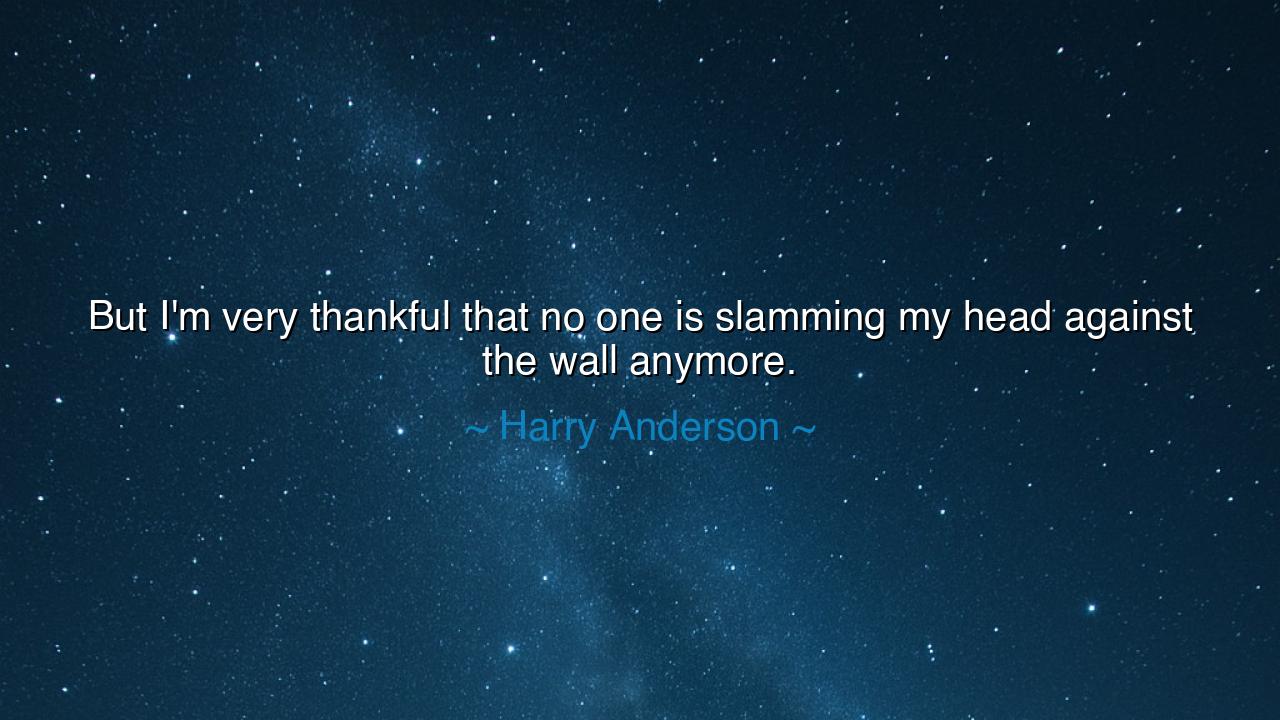
But I'm very thankful that no one is slamming my head against






Hear the words of Harry Anderson: “But I’m very thankful that no one is slamming my head against the wall anymore.” At first glance, these words may sound simple, even plain. Yet when held to the light of wisdom, they reveal a truth as old as the human struggle: gratitude is not only for great victories, but also for the ending of suffering, for the lifting of burdens, for the quiet peace that follows years of pain. It is a reminder that sometimes the most profound thanksgiving is born not of abundance, but of release.
The origin of this saying lies in the trials of hardship. Harry Anderson, like many who have endured rough beginnings, knew what it was to face cruelty, to be pressed down by violence or oppression. His gratitude was not gilded with wealth or honor, but with the relief that comes when torment ceases. There is a raw honesty here, stripped of ornament: it is the thanksgiving of one who has survived, who knows the sting of the wall, and now breathes freely because that chapter has ended. Such a voice is a gift, for it teaches us to see blessings where comfort has blinded us.
Think of the ancient Israelites who were freed from slavery in Egypt. Their thanksgiving was not for palaces or thrones, but simply that the lash no longer cut their backs, that chains no longer bound their limbs. They sang songs of deliverance, their joy born from the end of suffering. Likewise, Anderson’s words are a modern echo of that eternal truth: even the absence of pain is worthy of praise. For those who have walked through fire, a cool breeze is a blessing greater than gold.
Yet, there is another layer in these words: the power of resilience. To be thankful that no one is slamming your head against the wall is also to acknowledge survival, to say, “I have endured what sought to break me, and I am still here.” This kind of gratitude is not naïve—it remembers the darkness vividly—but it chooses to focus on the dawn. It is the kind of strength that can only be forged in the crucible of suffering, the wisdom of those who have looked into the abyss and lived to tell their tale.
Consider also the story of Viktor Frankl, a man imprisoned in Nazi concentration camps. In his memoir, Man’s Search for Meaning, he wrote of how even in a place of unimaginable suffering, a man could still find hope in the smallest mercies: a piece of bread, a glimpse of the sky, the simple fact of survival another day. Frankl’s gratitude was not for a life of luxury but for the tiny fragments of dignity and relief that could still be found amid horror. Anderson’s words carry that same echo—that true thanksgiving is not always about what we gain, but often about what we are spared.
The lesson here is clear: do not despise small mercies. In a world that teaches us to always reach for more—more wealth, more status, more comfort—we must remember to be thankful when hardship ends, when a weight is lifted, when a storm passes. The quiet spaces of relief are sacred, and to honor them with gratitude is to cultivate peace in the soul. He who only gives thanks for abundance will always hunger; but he who gives thanks even for relief will always be full.
So what practical actions may we take? First, learn to pause and recognize when something painful has ended. Do not rush past it, but breathe deeply and give thanks. Second, train your eyes to see even the smallest freedoms—no matter how ordinary—as gifts. Third, when you see another emerging from suffering, remind them that survival itself is a triumph, and help them find gratitude in their relief. In doing so, you will carry forward the wisdom of Anderson’s words, teaching others that freedom from pain is a treasure worth celebrating.
Thus, let the teaching of Harry Anderson be remembered: true gratitude is not only for the grand victories, but for the ending of cruelty, for the peace that follows the storm. When you awaken one day and realize that no one is slamming your head against the wall anymore—whether that wall is made of violence, despair, or circumstance—then lift your voice in thanksgiving, for that too is the blessing of life, and it is no small thing.






AAdministratorAdministrator
Welcome, honored guests. Please leave a comment, we will respond soon